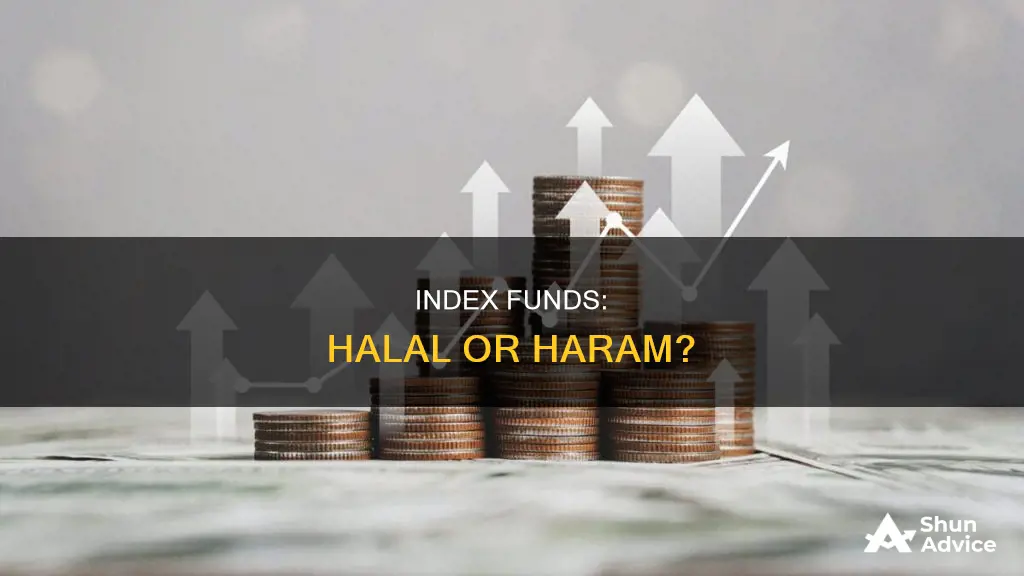
Investing in index funds is a contentious issue in the Islamic community. While some scholars argue that it is permissible as long as the companies involved are not engaged in impermissible activities, others claim that investing in index funds is haram because it involves investing in a consortium rather than individual companies. The key criteria for determining if an investment is halal or haram are the companies that constitute the fund and their sources of income. According to Islamic law, Muslims cannot invest in companies that generate a significant portion of their income from selling alcohol, tobacco, pork, weapons, gambling, or pornography. Additionally, Muslims are expected to avoid interest or Riba and companies with high debt.
| Characteristics | Values |
|---|---|
| Type of fund | Mutual fund or exchange-traded fund (ETF) |
| Purpose | To follow or track the components of a financial market index, e.g. S&P 500, FTSE 100, and the Nasdaq 100 |
| Management | Passive |
| Investment type | Invest in all or a representative sample of securities included in the index they track |
| Risk | Low |
| Costs | Low management fees and expense ratios |
| Tax | Tax-efficient |
| Halal status | Must meet specific criteria set by Islamic law |
| Prohibited industries | Alcohol, gambling, pork-related products, conventional financial services, and other impermissible activities |
| Interest (Riba) | Income from interest is prohibited in Islam |
| Debt levels | A common threshold is 33% of a company's total market capitalization |
| Interest-bearing cash and investments | Limit is typically around 33% or lower |
| Receivables and liquid assets | Receivables should not exceed 49% of a company's total assets |
| Purification of income | Any minor income from prohibited sources must be calculated and donated to charity |
What You'll Learn
- Islamic law prohibits investing in companies involved in haram activities
- Halal index funds must meet specific criteria set by Islamic law
- Islamic investors should pay attention to the expense ratios of index funds
- Islamic financial tips encourage a long-term perspective on investing
- Islamic law prohibits riba (interest)

Islamic law prohibits investing in companies involved in haram activities
Islamic law prohibits investing in companies involved in activities that are considered haram. These include businesses involved in alcohol, pork, gambling, and usury (riba). For example, investing in breweries or casinos would not be permissible.
Sharia-compliant investing, or 'halal investing', encourages a disciplined investment process that promotes in-depth security research and monitoring. It discourages short-term speculation and high portfolio turnover rates (frequent trading), as these may be interpreted as a form of gambling.
To be considered halal, a company must meet certain criteria. Firstly, its primary business activities must not violate the core tenets of Islam. This includes the manufacture or marketing of alcohol, gambling or gaming activities, conventional interest-based financial services, pork and pork products, and pornography. Most Islamic scholars also advise against investing in tobacco companies.
Secondly, the company's financial situation must be scrutinised. Islamic scholars have established guidelines, such as the "five percent rule", which states that a core business activity accounts for more than 5% of a company's revenue. If a company's interest-based income or holdings exceed certain limits, investing in that company is forbidden.
Additionally, Islamic scholars have set conditions for investing in companies that have interest-bearing debt. The company's primary business activity should be Sharia-compliant, and the level of debt should not exceed one-third of its market value.
It is important for Muslim investors to conduct thorough research and consult informed religious scholars before investing to ensure that their investments align with Islamic teachings.
A Guide to Index Fund Investing in Australia
You may want to see also

Halal index funds must meet specific criteria set by Islamic law
Islamic finance is guided by Sharia law, which is derived from the Quran and the Sunnah (practices of the Prophet Muhammad). Sharia law prohibits certain activities, and any index fund that is to be considered halal must adhere to these principles.
Firstly, there should be no element of riba (interest). This is mentioned in the Quran in several places, including:
> "Those who consume interest cannot stand [on the Day of Resurrection] except as one stands who is being beaten by Satan into insanity. That is because they say, 'Trade is [just] like interest.' But Allah has permitted trade and has forbidden interest... So if you repent, you may have your principal – [thus] you do no wrong, nor are you wronged."
Therefore, a halal index fund should not hold debt securities or invest in companies that derive significant income from interest. A common threshold is that a company's debt should not exceed 33% of its total market capitalization, though this ratio can vary.
Secondly, there should be no element of gharar (excessive uncertainty) or maysir (gambling). The Quran states:
> "O you who have believed, indeed, intoxicants, gambling, [sacrificing on] stone alters [to other than Allah], and divining arrows are but defilement from the work of Satan, so avoid it that you may be successful."
Thirdly, investments must avoid companies involved in activities forbidden by Islamic law, such as alcohol, gambling, pork-related products, conventional financial services (like banking and insurance that earn interest), and other impermissible activities.
Fourthly, there must be asset backing, meaning that every financial investment and transaction must relate to a tangible asset.
Fifthly, both parties in the transaction should share the risks and profits.
Finally, the investments should be ethical and should enhance communities and society, in keeping with the social justice element of Islamic finance.
These criteria are typically assessed and monitored using Sharia screening methodologies developed by financial institutions or Sharia advisory boards. Halal index funds use these guidelines to select and manage their portfolios, ensuring compliance with Islamic principles at all times.
Mutual Fund Investment: Smart Money Moves to Make Now
You may want to see also

Islamic investors should pay attention to the expense ratios of index funds
Islamic investors should pay close attention to the expense ratios of index funds to ensure they are reasonable and in line with industry standards. While index funds are generally known for their low fees compared to actively managed funds, it is important for Islamic investors to be mindful of the costs involved.
Sharia-compliant index funds often come with additional complexities and costs due to the need to adhere to Islamic financial principles. For example, the appointment of a Sharia board comprised of Islamic scholars can add to the overall cost of managing the fund. The fees for these scholars can be substantial, running into millions of dollars per year. Therefore, Islamic investors should carefully consider the expense ratios of different index funds to find options that are competitively priced while still adhering to Sharia principles.
Additionally, Islamic investors should be aware that the interpretation of Islamic law can vary among scholars, which may impact the consensus for analysis and implementation of specific investment decisions. This can further influence the expense ratios of Sharia-compliant index funds. It is advisable for Islamic investors to consult Islamic scholars or financial advisors well-versed in Islamic finance principles to gain valuable insights and make informed decisions.
By paying attention to the expense ratios, Islamic investors can ensure they are not overpaying for their investments while still adhering to their religious and ethical beliefs. It is important to strike a balance between finding competitively priced index funds and ensuring compliance with Sharia principles. This approach allows Islamic investors to make informed decisions that align with their financial goals and religious values.
In summary, Islamic investors should carefully consider the expense ratios of index funds by evaluating the fees charged and comparing them with industry standards. This due diligence ensures that their investments remain reasonable and aligned with the principles of Islamic finance, promoting long-term financial growth while adhering to their religious and ethical values.
Invest in Nifty 50 Index Funds: A Beginner's Guide
You may want to see also

Islamic financial tips encourage a long-term perspective on investing
Islamic financial principles encourage a long-term perspective on investing. This is because Islamic finance is guided by Sharia law, which prohibits certain activities such as interest (riba), gambling (maysir), and investing in businesses involved in forbidden (haram) industries, such as alcohol, gambling, or pork-related products.
When investing in index funds, Muslim investors should take a long-term perspective and focus on the potential for growth while avoiding speculation. Index funds are designed for long-term investment horizons as they aim to track the performance of the underlying index over time.
Screening Process: Before investing in any index fund, Muslim investors should conduct a thorough screening process to ensure that the underlying assets comply with Sharia principles. This involves examining the companies within the index to ensure they are not involved in prohibited activities or industries.
Sharia-Compliant Index Funds: There are now several Sharia-compliant index funds available in the market, which are designed specifically for Muslim investors. These funds adhere to Sharia principles in their investment selections, typically excluding companies involved in industries such as alcohol, tobacco, gambling, and financial services that derive significant income from interest-based activities.
Diversification: Diversification is a key principle of Islamic finance and is important when investing in index funds. By investing in a diversified index fund, Muslim investors can spread their risk across a wide range of companies and sectors while adhering to Sharia principles.
Expense Ratios: While index funds are known for their low fees, Islamic investors should ensure that the fees charged are reasonable and in line with industry standards. This helps to keep costs low and encourages a long-term perspective by avoiding excessive fees that can eat into potential profits.
Regular Review and Rebalancing: Muslim investors should regularly review their index fund holdings and rebalance as necessary to ensure that their portfolio remains aligned with their investment objectives, risk tolerance, and Sharia principles. This disciplined approach encourages a long-term perspective by focusing on consistent, steady growth rather than short-term gains.
Consultation with Islamic Scholars: For Muslim investors who are unsure about the Sharia compliance of certain index funds or investment decisions, seeking guidance from Islamic scholars or financial advisors well-versed in Islamic finance principles can provide valuable insights and clarity. This can help investors make informed, long-term investment decisions that align with their ethical and religious beliefs.
Selecting the Right Investment Fund for Your HSA
You may want to see also

Islamic law prohibits riba (interest)
> "Those who consume interest cannot stand [on the Day of Resurrection] except as one stands who is being beaten by Satan into insanity. That is because they say, 'Trade is [just] like interest.' But Allah has permitted trade and has forbidden interest... So if you repent, you may have your principal – [thus] you do no wrong, nor are you wronged." (Quran 2:275-279)
In addition to prohibiting interest, Islamic law also forbids investing in companies involved in activities forbidden by Islam, such as alcohol, gambling, and pork-related products.
When it comes to index funds, the decision to invest must be made with awareness of the need to avoid riba and investments in haram (prohibited) industries. Index funds are a type of mutual fund or exchange-traded fund (ETF) that tracks the components of a financial market index, such as the S&P 500, NASDAQ, or Dow Jones Industrial Average. They offer broad market exposure, low operating expenses, and low portfolio turnover, making them attractive to investors seeking diversification and low costs.
For Muslim investors, there are specific considerations to keep in mind when investing in index funds. It is essential to conduct a thorough screening process to ensure that the underlying assets comply with Sharia principles. This involves examining the companies within the index to ensure they are not involved in prohibited activities or industries.
Some key criteria for index funds to be considered halal include:
- Avoiding investments in companies involved in activities forbidden by Islamic law, such as alcohol, gambling, and pork-related products.
- Not holding debt securities or investing in companies that derive significant income from interest.
- Maintaining a low level of debt, typically below 33% of the company's total market capitalization.
- Minimizing the proportion of interest-bearing cash or securities within a company's assets, often limited to around 33% or lower.
- Considering the level of receivables and liquid assets, with some standards suggesting that receivables should not exceed 49% of the company's total assets.
- Purifying any minor income from prohibited sources by calculating and donating it to charity.
To assist Muslim investors, there are now several Sharia-compliant index funds available in the market. These funds are designed to adhere to Islamic financial standards and employ Sharia boards to ensure compliance. By investing in these funds, Muslim investors can ensure their investments are aligned with their ethical and religious beliefs.
In conclusion, Islamic law prohibits riba (interest) and investing in companies involved in haram activities. When considering index funds, Muslim investors must carefully scrutinize the fund's holdings and its adherence to Islamic ethical standards. Sharia-compliant index funds offer a practical solution, ensuring compliance with religious obligations while providing financial returns and peace of mind.
Unlocking Funds for Your Next Investment Property
You may want to see also
Frequently asked questions
According to Islamic principles, investors must share in profit and loss, receive no interest (riba), and not invest in a business prohibited by Islamic law, or sharia. The AAOIFI (Accounting and Auditing Organization for Islamic Financial Institutions) standards state that it is permissible to buy and sell shares of corporations if the activity of the corporation is permissible, irrespective of its being an investment or a deal.
Islamic law imposes several restrictions on investing in index funds. Firstly, Muslims cannot invest in anything that could harm others or the environment, or in companies promoting weapons, alcohol, tobacco, pork, gambling, or pornography. Secondly, Muslims are expected to avoid interests or Riba and investments in companies with high levels of debt. Lastly, Islamic law discourages short-term speculation and frequent trading, as some scholars interpret this as a form of gambling.
Halal investing offers several benefits, including a disciplined investment process that encourages in-depth security research and monitoring. The low debt requirements of Islamic screens appeal to risk-averse investors and promote a conservative approach. Additionally, halal investing discourages short-term speculation and frequent trading, minimizing portfolio trading expenses and increasing tax efficiency.
Shariah-compliant mutual funds are a type of socially responsible investing based on the moral code of Islam, or Shariah law. These funds invest within the boundaries of Islamic laws and adhere to specific restrictions on investment types. They avoid companies that generate income from selling alcohol, tobacco, pork, weapons, gambling, and pornography. Shariah-compliant funds also prohibit all forms of interest and tend to avoid derivatives and companies with high debt.







